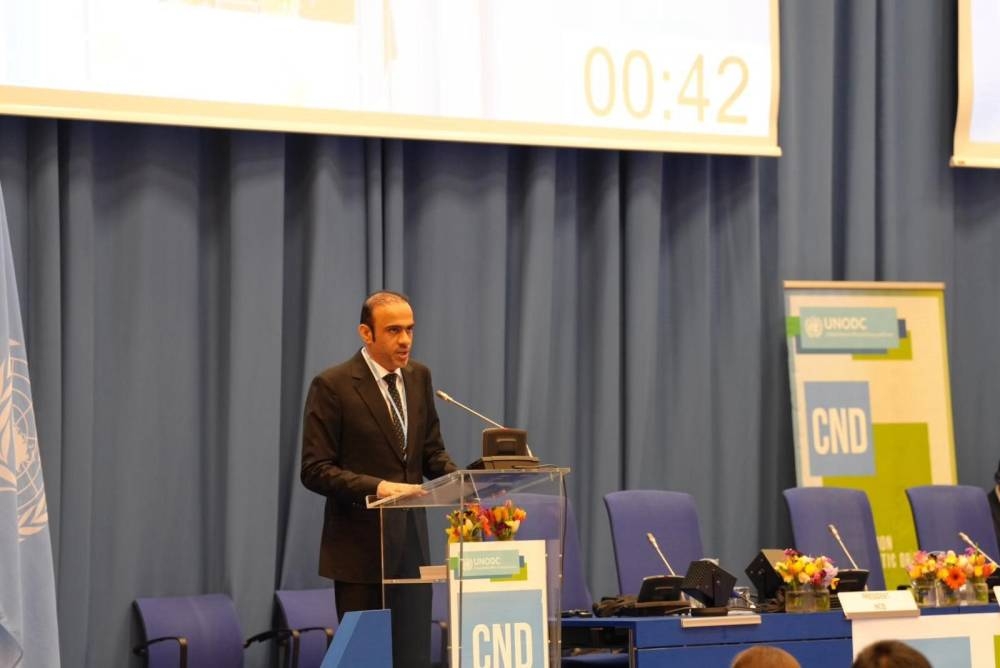The State of Qatar has emphasized that the challenges the world faces today in combating drugs can only be addressed through the implementation of commitments under the three international drug control conventions, ministerial declarations, and support for the Commission on Narcotic Drugs (CND) as the primary policymaking body of the United Nations responsible for drug control affairs.
This was addressed in a statement delivered by His Excellency Mr. Jassim Yaqoub Al-Hammadi, Qatar's Ambassador and Permanent Representative to the United Nations and International Organizations in Vienna, at the 68th session of the Commission on Narcotic Drugs held in Vienna.
Ambassador Al-Hammadi remarked that international joint efforts are still inadequate in addressing illicit drug production and trafficking. The 2024 World Drug Report, issued by the United Nations Office on Drugs and Crime (UNODC), presented a grim picture. Cocaine production has reached record levels, drug use has increased—especially among adolescents and young people—and the variety of drugs has expanded. Additionally, the number of countries and jurisdictions allowing the recreational use of cannabis has increased. In short, we are still far from achieving our ultimate goal of a drug-free world.
HE continued, saying that despite the bleak picture, there are some positive indicators, such as the sharp decline in opium production in Afghanistan and the ongoing efforts by the Syrian government to dismantle captagon laboratories and destroy the produced stock. HE called for concerted international efforts to support Afghanistan and the Syrian Arab Republic, particularly in helping Afghan farmers through alternative development programs and supporting domestic economic alternatives to drug cultivation.
In the statement, the State of Qatar expressed its support for the conclusions of the 2024 World Drug Report, which highlighted that dismantling drug economies requires addressing the root structural causes behind illicit crop cultivation, such as poverty, lack of development, and the factors that lead to the entrapment of children and youth to fall into the clutches of drugs.
The State of Qatar reaffirmed the essential role of the Commission on Narcotic Drugs as the primary policymaking body of the United Nations responsible for drug control, and the pivotal role of the United Nations Office on Drugs and Crime as the leading entity within the UN system in addressing the global drug problem. Qatar also emphasized the importance of the role of the International Narcotics Control Board and the World Health Organization under the conventions.
The State of Qatar called for adequate support to be provided to the UNODC to enhance its efforts in offering technical assistance and capacity-building to Member States to effectively address emerging and persistent drug-related challenges, alongside its other activities in awareness, education, and outreach, stressing the need to address the UNODC’s current financial difficulties, which have hindered its ability to prepare the report on the global drug trafficking situation and forced it to delay meetings of the Commission on Narcotic Drugs' subsidiary bodies for 2024.
Ambassador Al-Hammadi outlined the measures taken by the State of Qatar to fulfill its commitments under the three drug control conventions, ministerial declarations and action plans. HE highlighted the continuous support Qatar provides to the UNODC to enhance its efforts in offering technical assistance and capacity-building to Member States, as well as its commitment to supporting the Commission on Narcotic Drugs.
With regard to bilateral, regional, and international cooperation to combat illicit drug trafficking, His Excellency affirmed Qatar's commitment to and participation in the Global Coalition to Address Synthetic Drugs Threats.
On a national level, The State of Qatar's Permanent Representative to the United Nations and International Organizations in Vienna concluded the statement by expressing that the State of Qatar takes pride in its national record in protecting its people from the scourge of drugs. This achievement is due to the adoption of the National Drug Control Strategy that features integrated elements, clear objectives, flexible programs, and a focus on preventive measures to safeguard society, particularly the youth, through education, awareness, and warnings against falling into the clutches of the scourge of drugs.

